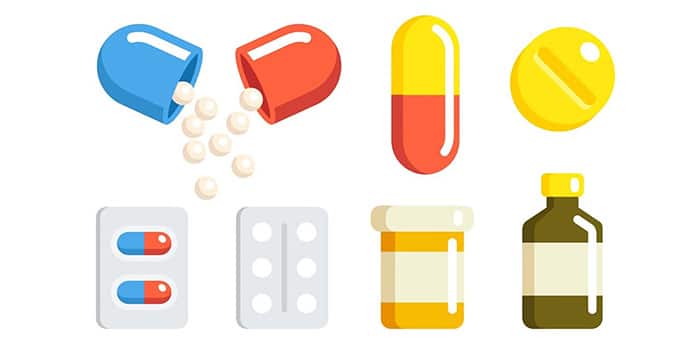Bricanyl (terbutaline) is a drug that enables breathing easily by widening the airways. It is used to treat symptoms such as wheezing, shortness of breath and chest tightness caused by respiratory diseases such as asthma, COPD, bronchitis and emphysema. The most common side effects are shivering and headaches. It is available on the market as tablet, syrup and dry-powder inhaler. As the use of each form and the dosages are different, it must be used under the supervision of a doctor.
Table of Contents
What is Bricanyl (terbutaline)?
Bricanyl is a medicine prescribed to ease breathing and prevent respiratory problems caused by respiratory diseases such as asthma, chronic obstructive pulmonary disease (COPD), bronchitis and emphysema. Its active ingredient terbutaline is a bronchodilator that works by opening the respiratory tract. It is in a drug class called betaagonists. Bricanyl is available on the market in tablet, syrup and dry-powder inhaler forms. The tablet or syrup forms are ineffective in an acute asthma attack. Dry-powder inhaler is the effective form in such cases.
What is Bricanyl used for?
Bricanyl is used to prevent and treat wheezing, dyspnea and chest tightness caused by asthma, COPD, chronic bronchitis and emphysema.
How does Bricanyl work?
Terbutaline, the active ingredient of the drug, is in a drug class called betaagonists. It eases breathing by relaxing and widening the airways.
How to use Bricanyl?
How to use Bricanyl properly?
- Take your tablet with a glass of water without chewing or crushing it. For the syrup form, use the 5 ml dosing spoon inside the box.
- Take Bricanyl at the prescribed dose exactly as recommended by your doctor. Do not change the dose without consulting your doctor.
- If you feel any unexpected side effect, consult your doctor or pharmacist.
- Never give your medicine to anyone else.
- If your dose does not relieve your symptoms, you must inform your doctor. You may need an additional treatment.
- If you forget to take your dose, take it as soon as you remember it. If you have a short time to take the other dose, skip the dose and continue your routine treatment. Do not take a double dose.
- If you need to use Bricanyl daily, you may need to use an additional medicine, such as inhaled corticosteroids, to reduce inflammation in your lungs.
- Bricanyl is not suitable for the use of children below 6 years old.
- Dry-powder inhaler is sold with a plastic inhalation device. Always use this device when taking your medicine. Be sure to use the medicine only when necessary.
- Young children may have trouble using the dry-powder inhaler. Make sure your child understands the instructions and can follow them thoroughly.
- After the inhalation, rinse your mouth with water to remove medicine that may stick to the mouth or throat.
Doses of Bricanyl and Dose Adjustment
Tablet dose adjustment
- In adults: The recommended starting dose is 1 tablet (2.5 mg) 3 times a day. If necessary, your doctor may increase the daily dose to 2 tablets (5 mg) 3 times a day after 1-2 weeks,
- For children between 7-15 years of age: The dose is adjusted based on the child’s weight. The recommended daily doses are:
- For children weighing less than 20 kg, 1⁄4- 1⁄2 tablet 3 times a day
- For children weighing between 20-30 kg, 1⁄2-1 tablet 3 times a day
- For children weighing more than 30 kg, 1-2 tablets of 3 times a day
Syrup dose adjustment
- In adults and children over 12 years old: The recommended daily dose is 10 to 15 ml (2-3 scales) 3 times a day.
- For children between 6-12 years old: The dose is adjusted based on the child’s weight. It should be used as prescribed by the doctor.
Bricanyl Turbohaler dose adjustment
- In adults and children over 12 years old: The recommended dose is 1 inhalation (0.5 mg) when needed. If necessary, up to 3 inhalations (1.5 mg) can be administered at a time. The maximum dose that can be administered daily is 12 inhalations (6 mg).
- For children between 3-12 years old: The recommended dose is 1 inhalation (0.5 mg) when needed. If necessary, up to 2 inhalations (1 mg) can be administered at a time. The maximum dose that can be administered daily is 8 inhalations (4 mg).
The medicine is usually effective within 5 minutes and its effect lasts up to 6 hours. It is effective even in an acute asthma attack.
Overdose of Bricanyl
If you take Bricanyl more than you should, you may experience symptoms such as headache, irregular heartbeat, shortness of breath, muscle spasm, changes in mood, tremors, dizziness and lightheadedness. In this case, call your doctor. In addition, guaifenesin in Bricanyl can cause kidney stones at high doses.
Bricanyl Drug Interactions
Combining Bricanyl with certain medicines may reduce the effect of the medicine. Therefore, inform your doctor about all prescription and over-the-counter medicines you take, including herbal supplements. Bricanyl should not be used with the following drugs:
- Steroid drugs (prednisolone etc.),
- Medicines used in gout treatment (theophylline, aminophylline etc.),
- Diuretic medicines (may cause potassium deficiency)
- Adrenergic drugs
- General anesthetics (May cause arrhythmia. Tell your doctor that you are using Bricanyl before surgery)
Bricanyl and Alcohol Interactions
Alcohol may cause some side effects of Bricanyl to exacerbate. Consult your doctor if you are going to consume alcohol while taking the medicine.
Forms and Types of Bricanyl
- Bricanyl Tablet: 5 mg
- Bricanyl Expectorant Syrup: 1.5 mg / 5 ml + 66.5 mg / 5 ml
- Bricanyl Turbohaler: 0.5 mg / dose
Who should not take Bricanyl?
Do not take Bricanyl if you are allergic to terbutaline, the active ingredient of the medicine, or to any inactive ingredients of the medicine.
In which situations is Bricanyl inconvenient?
You should take Bricanyl with caution if you have any of the following conditions. Be sure to inform your doctor so that s/he can make necessary dose adjustments:
- Problems during pregnancy,
- Any heart disease,
- Diabetes
- Hyperthyroidism (thyroid dysfunction)
Use of Bricanyl during Pregnancy and Breastfeeding
Use of Bricanyl during pregnancy may cause heart and lung problems in mother and baby. Therefore, it should not be taken during pregnancy. A safe method of contraception should be used during treatment.
If you are pregnant or planning to become pregnant, you should inform your doctor before starting a treatment. If you become pregnant while taking the medicine, discontinue and consult your doctor immediately.
There is no known risk of Bricanyl use while breastfeeding. However, the ingredients in the medicine pass through milk. Therefore, you should inform your doctor before starting a treatment if you are breastfeeding.
Side Effects of Bricanyl
Serious side effects
The following side effects mean that you are allergic to an ingredient of Bricanyl. If you experience any of these side effects, call your doctor and apply to an emergency of the nearest hospital immediately:
- Skin rashes
- Itching
- Swelling in the face, tongue and throat
- Difficulty in breathing
Very Common Side Effects
- Trembling
- Headache
Common Side Effects
- Faster heart rate or palpitations
- Muscle cramps
- Muscle weakness, thirst, or pins and needles feeling caused by low levels of potassium




